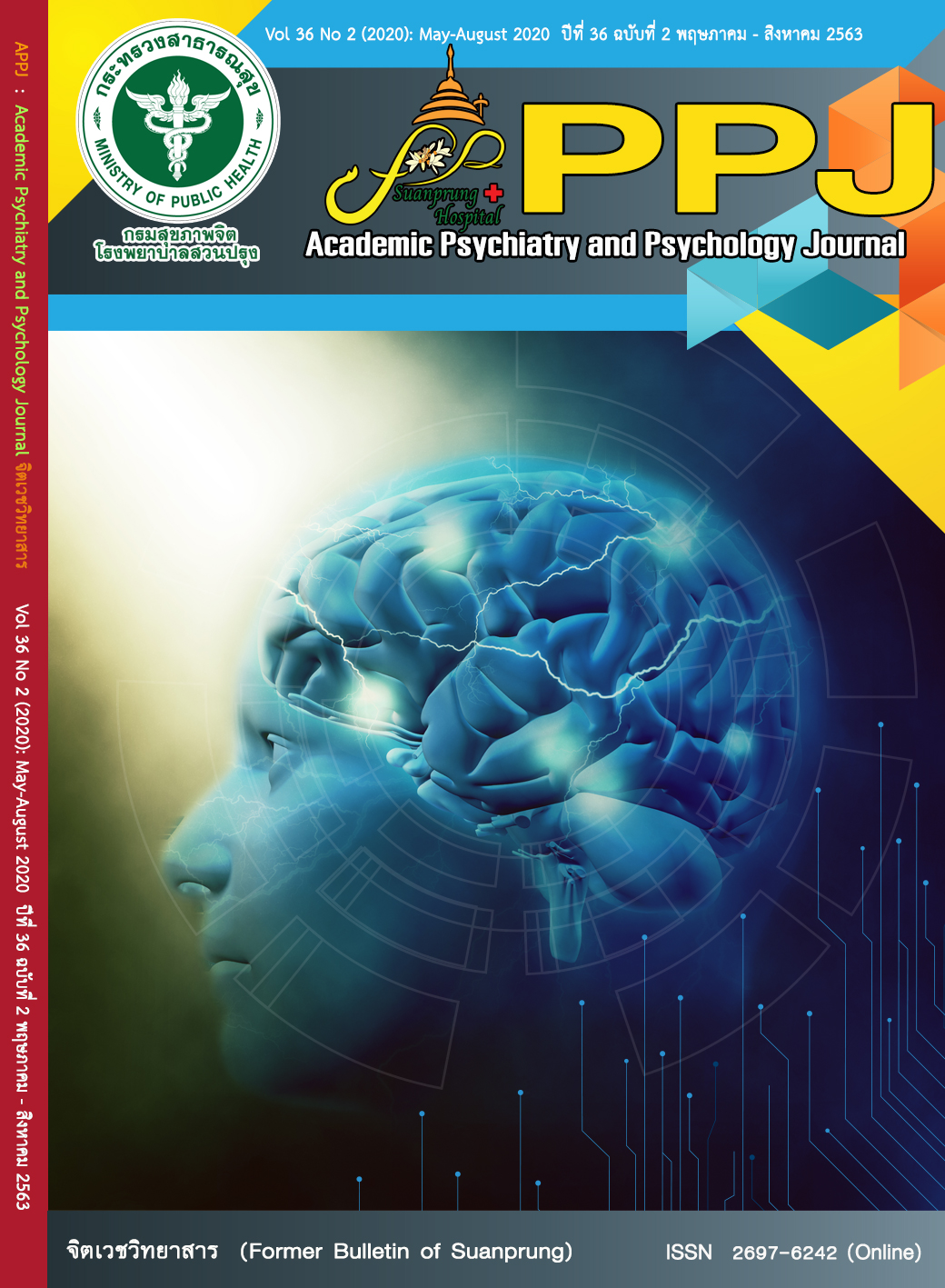ประสิทธิผลของการบำบัดทางความคิดและพฤติกรรมด้วยตนเองของผู้ป่วยโรคติดสุรา ที่มีภาวะซึมเศร้าโรงพยาบาลสวนปรุง จังหวัดเชียงใหม่
Main Article Content
บทคัดย่อ
วัตถุประสงค์: เพื่อศึกษาประสิทธิผลของการใช้คู่มือการบำบัดทางความคิดและพฤติกรรมด้วยตนเองในผู้ป่วยโรคติดสุราที่มีภาวะซึมเศร้า โรงพยาบาลสวนปรุง
วัสดุและวิธีการ: รูปแบบการศึกษาครั้งนี้คือวิจัยเชิงปฏิบัติการศึกษาระหว่างเดือนมีนาคม ถึง มิถุนายน พ.ศ. 2562 เลือกกลุ่มตัวอย่างแบบเฉพาะเจาะจง 50 คน และพยาบาลจำนวน 6 คนเครื่องมือที่ใช้ในการศึกษา ได้แก่ 1) แบบบันทึกข้อมูลส่วนบุคคล 2) แบบประเมินภาวะซึมเศร้า 3) แบบประเมินปริมาณการดื่มสุรา 4) แบบสอบถามความพึงพอใจของผู้ป่วยโรคติดสุรา 5) แบบสอบถามความคิดเห็นของพยาบาล และ6) คู่มือการบำบัดทางความคิดและพฤติกรรมด้วยตนเองที่พัฒนาโดยต๊ะปินตา, สกุลพรรณ์, กิตสัมบันท์ และล่องชูผล (2017) วิเคราะห์ข้อมูลส่วนบุคคลโดยใช้สถิติเชิงพรรณนา คือการแจกแจงความถี่ หาค่าร้อยละ หาค่าเฉลี่ยและส่วนเบี่ยงเบนมาตรฐานและวิเคราะห์ข้อมูลจำนวนผู้ป่วยที่มีภาวะซึมเศร้าและพฤติกรรมการดื่มสุราลดลง คือการแจกแจงความถี่ และหาค่าร้อยละ
ผลการศึกษา: พบว่าผู้ป่วย 10 คนออกจากการศึกษา คงเหลือผู้ป่วย 40 คนมีภาวะซึมเศร้าและพฤติกรรมการดื่มสุราลดลงในระยะหลังการใช้คู่มือสิ้นสุด 2 สัปดาห์ และในระยะติดตามผล 6 สัปดาห์ และผู้ป่วยมีความพึงพอใจกับการใช้คู่มือทุกด้านอยู่ในระดับมากรวมทั้งความคิดเห็นของพยาบาลผู้ที่แนะนำการใช้คู่มือ มีความพึงพอใจระดับมากในการประเมินทุกด้าน
สรุป: คู่มือการบำบัดทางความคิดและพฤติกรรมด้วยตนเองในผู้ป่วยโรคติดสุรา อาจมีประสิทธิผลในการช่วยลดภาวะซึมเศร้าและพฤติกรรมการดื่มสุราได้
Article Details
บทความหลังผ่านการปรับแก้จากกองบรรณาธิการแล้ว เป็นลิขสิทธ์ของวารสารจิตเวชวิทยาสาร โรงพยาบาลสวนปรุง กรมสุขภาพจิต กระทรวงสาธารณสุข ห้ามเผยแพร่เพื่อประโยชน์ทางการค้าโดยไม่ได้รับอนุญาต แต่อนุญาตให้เผยแพร่บทความดังกล่าวเพื่อประโยชน์ทางการศึกษาแก่ประชาชนทั่วไป ทั้งนี้กองบรรณาธิการไม่จำเป็นต้องเห็นด้วยกับบทความหรือข้อคิดเห็นใดๆ ที่ปรากฏในวารสารสวนปรุง
เอกสารอ้างอิง
American Psychiatric Association. Diagnostic and statistical manual of mental disorders. BMC Med. 2013;17:133-7.
Kuria MW, Ndetei DM, Obot IS, Khasakhala LI, Bangaka BM, Mbugua MN, Kamau J. The association between alcohol dependence and depression before and treatment for alcohol dependence. ISRN Psychiatry. 2012 Jan 26;2012:482802. doi:10.5402/2012/482802.
Beck JS. Cognitive behavior therapy: Basics and beyond. New York: Guilford Press; 2011.
Thapinta D, Skulphan S, Kitsumban V, Longchoopol C. Cognitive behavior therapy self-help booklet to decrease depression and alcohol use among people with alcohol dependence in Thailand. Issues Ment Health N. 2017;38(11):964-70.
Cuijpers P, Donker T, van Straten A, Li J, Andersson G. Is guided self-help as effective as face-to-face psychotherapy for depression and anxiety disorders? A systematic review and mata-analysis of comparative outcome studies. Psychol Med. 2010;40(12):1943-57.
Pearson A, Wiechula R, Court A, Lockwood C. The JBI model of evidence-based health care. Int J Evid Base Healthc. 2005;3(8):207-15.
Rogers EM. Diffusion of innovations. 4th ed. New York: The Free Press;1995.
Hemrungroj S. Montreal Cognitive Assessment (MoCa): Thai version. 2009; 1 Sep 2015.
Nasreddine Z, Chertkow H, Phillips N, Whitehead V, Cummings J. The Montreal Cognitive Assessment (MoCa): a brief cognitive screening tool for detection of mild cognitive impairment. P02. 063. Neurology. 2004;62(25).
Lotrakul M, Sumrithe S, Saipanish R. Reliability and validity of the Thai version of the PHQ-9. BMC psychiatry. 2008;8(1):46.
Robinson SM, Sobell LC, Sobell MB, Leo GI. Reliability of the timeline followback for cocaine, cannabis, and cigarette use. PAB. 2014;28(1):154.
Thapinta D, Skulphan S, Kittrattanapaiboon P. Brief cognitive Behavioral therapy for depression among patients with alcohol dependence in Thailand. Issues in mental health nursing. 2014;35(9):689-93.
Westbrook D, Kennerley H, Kirk J. An introduction to cognitive behaviour therapy: Skills and applications. 2nd ed. Los Angeles: Sage; 2011.
Philp F, Lucock MP, Wilson Ar. Primary care-based guided self-help for depression provided by a nurse practitioner: A pilot evaluation. PCMH. 2006;4(3):159.
Thapinta D. Depression: Cognitive behavior therapy and counseling. 2nd ed. Chiang Mai: Wanida Printing; 2013. (In Thai)
Beck JS, Beck AT. Cognitive therapy: Basics and beyond. New York: Guilford press; 1995.
Laaksonen E, Vuoristo-Myllys S, Koski-Jannes A, Alho H. Combining medical treatment and CBT in treating alcohol-dependent patients: effects on life quality and general well-being. AAA. 2013;48(6):687-93.
Martin GW, Rehm J. The effectiveness of psychosocial modalities in the treatment of alcohol problems in adults: a review of the evidence. Can J Psychiat. 2012;57(6):350-8.
Hobbs JD, Kushner MG, Lee SS, Reardon SM, Maurer EW. Meta-analysis of supplemental treatment for depressive and anxiety disorders in patients being treated for alcohol dependence. AAAP. 2011;20(4):319-29.
Richards A, Barkham M, Cahill J, Richards D, Williams C, Heywood P. PHASE: a randomised, controlled trial of supervised self-help cognitive behavioural therapy in primary care. Br J Gen Pract. 2003 Oct 1;53(495):764-70.

